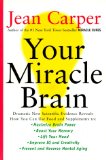 I am often asked if there are specific vitamins that are proven to enhance brain and cognitive function. The answer is yes but the level of improvement is not always clear. Vitamins that are generally called out for their brain boosting effects include:
I am often asked if there are specific vitamins that are proven to enhance brain and cognitive function. The answer is yes but the level of improvement is not always clear. Vitamins that are generally called out for their brain boosting effects include:
- B vitamins – memory and brain development
- Antioxidants or vitamins E, C and A (beta carotene) – overall functioning
- Multivitamins – overall functioning
Of course it is not just vitamins that help our brain function well but other supplements (e.g. minerals and fatty acids) and the foods we eat. Diet and supplements will be a frequent topic on the Next Brain Blog.
For a comprehensive overview of how supplements and diet impact brain function I suggest you read (or listen to) Jean Carper’s book, Your Miracle Brain: Dramatic New Scientific Evidence Reveals How You Can Use Food and Supplements To: Maximize Brain Power, Boost Your Memory, Lift Your Mood, Improve IQ and Creativity, Prevent and Reverse Mental Aging.
If you take supplements or have customized your diet to improve cognitive performance please leave a comment and share your results.
How well we learn from experience determines how far we go in our careers and personal relationships. Experiential learning is so basic we take it for granted but it is a complex cognitive process that requires many different skills. Fortunately, we can get better at it, much better at it.
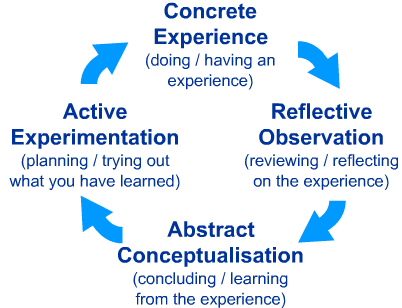 Learning from experience is a four-step process that repeats. The diagram to the right is based on David Kolb’s theory of experiential learning and illustrates the steps and some of the basic skills involved. What can we learn using this process? Nearly everything it turns out. How to get along with a difficult boss, how to make money on the internet, how to loose weight, how to be happy in retirement and any other worthwhile goal that involves trial and error.
Learning from experience is a four-step process that repeats. The diagram to the right is based on David Kolb’s theory of experiential learning and illustrates the steps and some of the basic skills involved. What can we learn using this process? Nearly everything it turns out. How to get along with a difficult boss, how to make money on the internet, how to loose weight, how to be happy in retirement and any other worthwhile goal that involves trial and error.
The key is try something (concrete experience), observe the effects (reflective observation), draw conclusions (abstract conceptualization), modify your approach (active experimentation) and try again (concrete experience). Often it takes many cycles or attempts to learn something from experience.
Learning from experience is hard to do well. Major challenges include:
- Lack of the skills needed to move through one of the key steps in the process
- Overemphasizing one or two of the key steps
- Giving up too soon or not completing enough cycles for deep learning
- Not moving through the necessary cycles fast enough or cost-effectively
- Not managing it as a process or just “letting it happen”.
Each of these challenges can be met but it takes considerable time and effort. Improving your capacity to learn from experience pays lifelong dividends but like improving critical reasoning or emotional intelligence, requires a considerable investment. Given this, it will be a frequent topic on the Next Brain blog.
A great way to get started is to begin to explicitly manage the process and to learn more about your particular approach to experiential learning.
You can start to manage your experiential learning process by journaling. Focus on a specific goal, something you are already in the process of trying to learn. Keep notes on what you are hypothesizing, testing, trying and observing as you move through the process. The simple act of recording the process in writing and diagrams automatically brings structure and insight. Sometimes just asking the question – What am I actively trying to learn from experience at work and home? – can produce improvements.
 You can use Kolb’s Learning Style Inventory to understand more about your approach, strengths and weakness across the four steps int the process. You answer 13 questions and need to do some simple math and graphing but it is a scientifically validated instrument. It tells you about your style and provides practical advice on how to improve. You can buy a packet of 10 assessments from the Hay Group for $125. A bit pricey but if you are working with a group that is interested in improving learning from experience it is well worth the money. Working in a small group will have many other advantages. I don’t think anyone sells a single copy of the Learning Style Inventory but I did find, Using Kolb’s Learning Style Inventory, at the University of Georgia. This is a 7MG PDF file with a scanned copy of an older version.
You can use Kolb’s Learning Style Inventory to understand more about your approach, strengths and weakness across the four steps int the process. You answer 13 questions and need to do some simple math and graphing but it is a scientifically validated instrument. It tells you about your style and provides practical advice on how to improve. You can buy a packet of 10 assessments from the Hay Group for $125. A bit pricey but if you are working with a group that is interested in improving learning from experience it is well worth the money. Working in a small group will have many other advantages. I don’t think anyone sells a single copy of the Learning Style Inventory but I did find, Using Kolb’s Learning Style Inventory, at the University of Georgia. This is a 7MG PDF file with a scanned copy of an older version.
If you try your hand at journaling, complete the Learning Style Inventory or have other insights into how to get starting in improving experiential learning, please post a comment.
Sources:
Image of learning from experience cycle
Image of Learning Style Inventory
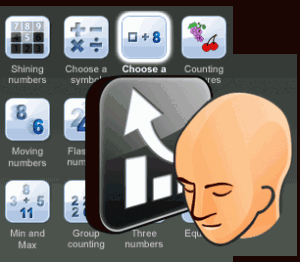 Brain games are all the rage. These are games you play for fun on your PC, game console or phone that also improve your cognitive functioning. There are dozens of traditional games and more recently scientifically-designed games that aim to improve memory, processing speed, visual perception, problem solving skill, mental focus and many other aspects of cognitive performance.
Brain games are all the rage. These are games you play for fun on your PC, game console or phone that also improve your cognitive functioning. There are dozens of traditional games and more recently scientifically-designed games that aim to improve memory, processing speed, visual perception, problem solving skill, mental focus and many other aspects of cognitive performance.
Do they work? Scientific American published an interesting article that took on that very question. What they found was many (50 or so) studies that show brain games can improve task performance but few if any that show that the effects translate into improvements in everyday cognitive activities. But they are optimistic:
One thing remains clear: there is no serious harm to brain training other than the effect on your wallet (and the risk of some egg on your face if your seven-year old can play them better). And evidence is accumulating that they not only improve the skills they are designed to help, but likely generalize to other cognitive abilities and have some long-lasting benefits.
Given this, games will be a frequent topic in the Next Brain Blog.
Another question to ask is are they fun? I’ve tried many of the scientifically designed brain games and find them boring after a couple of plays. Fortunately, some traditional games and puzzles also offer some cognitive performance boosts. For example, the popular math puzzle Sudoku is included in BrainAge, a brain training program pack with games that runs on a Nintendo DS handheld video game device.
The key is to find brain games that are truly fun for you and that have evidence supporting claims of cognitive improvement.
Here are some links to get your search started:
Please post a comment on your favorite game that has brain boosting effects.
Source: Image of Resco Brain Games
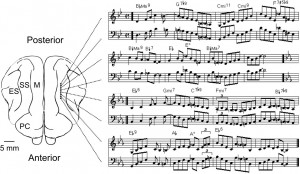 I get this question a lot. It goes back to the craze around the Mozart Effect or the idea you can get smart by listening to Mozart’s music. As far as I can tell there is no (or little) scientific evidence to support the idea. There is some evidence however that listening may temporarily (10-15 min) improve your spatial reasoning skills.
I get this question a lot. It goes back to the craze around the Mozart Effect or the idea you can get smart by listening to Mozart’s music. As far as I can tell there is no (or little) scientific evidence to support the idea. There is some evidence however that listening may temporarily (10-15 min) improve your spatial reasoning skills.
More relevant for readers of the next Brain Blog is the growing evidence that learning to play a musical instrument can improve many cognitive skills and perhaps raise IQ. Scans reveal musician’s brains look different and they tend to score higher on standardized tests for spatial-temporal tasks, verbal memory and even math. One study suggested a small increase in IQ of children taking music lessons.
As learning to play a musical instrument brings intrinsic satisfaction, it may be a particularly good option for building YourNextBrain! Interested to hear from reader with brain boosting experiences related to learning an instrument.
Source: Image of brain and sheet music
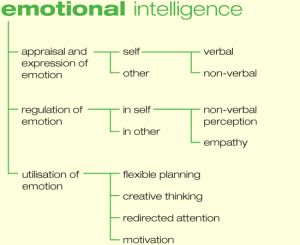 Daniel Goleman popularized the notion of Emotional Intelligence in 1995 in his best selling book by the same name. The idea is that a lot of what counts as smarts comes from our ability to perceive and manage emotions in ourselves and others. This is the foundation for self control and healthy relationships and leads to a successful life. The focus on emotional thinking versus rational or logical thinking as a key to intelligence was a huge paradigm shift that is still unfolding today.
Daniel Goleman popularized the notion of Emotional Intelligence in 1995 in his best selling book by the same name. The idea is that a lot of what counts as smarts comes from our ability to perceive and manage emotions in ourselves and others. This is the foundation for self control and healthy relationships and leads to a successful life. The focus on emotional thinking versus rational or logical thinking as a key to intelligence was a huge paradigm shift that is still unfolding today.
There is no doubt that understanding and manging emotions is a key for improving learning, decision-making, creativity, collaboration and other cognitive skills. Emotional intelligence will be a frequent topic on the Next Brain Blog. In an earlier post I provided links to quick and in-depth surveys that let you measure your emotional quotient (EQ) or level of emotional intelligence. In this post we will start to examine techniques for improving it.
For a quick introduction to how to develop your EQ check out the HELPGUIDE’s post on Five Key Skills for Building Emotional Intelligence. Although there are literally thousands of websites, books and other resources for learning about EQ I like this site. It demonstrates that emotional intelligence is rooted in common-sense life skills such as quickly reducing stress and managing your own feelings. No rocket science but the fact is that we often don’t take the time to develop specific skills to do these kinds of things and that impedes our cognitive performance.
Check the site out and please comment on the specific techniques you use to develop EQ.
Source: Emotional Intelligence Image
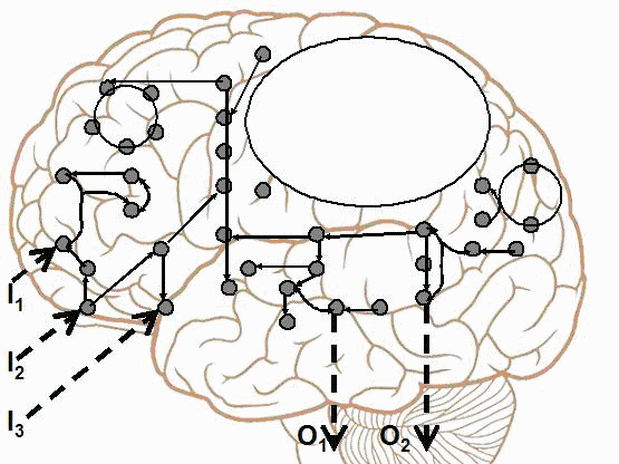
In this Blog we will explore all manner of techniques for improving your mind and brain.
_________________________________________________________________________________________________________
Source: Brain image comes from a cover of NeuroQuantology: An interdisciplinary journal of neuroscience and quantum physics
Playing things out in your mind before you actually do them is a great way to improve performance in many different types of tasks. Mental practice or rehearsing is a technique that is taught to athletes, managers, high-performance sales people and many other professionals. How to improve you skill in mental practice will be a frequent topic on the Next Brain Blog.
For a quick introduction check out Head Games: An Introduction to Mental Rehearsal by Dr. Scott Williams a Professor of Management and Director of the Center for Innovation at Wright State University.
He offers this nine-step procedure for doing mental practice (and I quote):
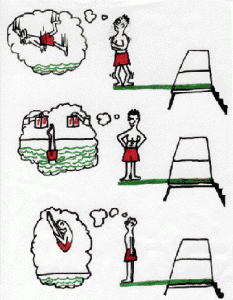 “Find a time and place where you won’t be interrupted.
“Find a time and place where you won’t be interrupted.- Recline or lie down, and close your eyes.
- Relax, concentrate, and focus. Take deep breaths and exhale slowly. As you exhale, imagine that stress is leaving your body. Start at your feet … feel all the stress leave your feet … then your legs … then your chest … all the way to the top of your head … feel all the stress leave your body. Free your mind of distractions and allow your mind to focus on the relaxation process.
- Once relaxed, focus on the specific challenging task.
- Mentally tell yourself that you are confident and that you have the ability to perform this task successfully. Repeatedly tell yourself, with confidence, that you will be successful.
- Imagine what you will see just before you begin the task. Visualize yourself as an active participant, not as a passive observer. For example, to mentally rehearse putting a golf ball, imagine that you are standing on the green rather than watching yourself from the gallery.
- Remaining relaxed and focused, mentally rehearse successful performance of this task. Imagine going through the process and seeing successful results.
- Repeat step 7 several times.
- Finally, open your eyes and smile. You have successfully performed in your mind, which is great preparation for actual performance. You should now be confident that you will perform successfully in the real situation. Remember to praise yourself for being successful. Self-reinforcement is another a key to self-motivation.”
Try this out on a task or performance you have coming up in the next couple of days. Does it work? Leave a comment and share your experience and results.
Source: Image of Diver
One technique for improving your brain and mind is tuning your diet. There have been many studies making claims about how certain nutrients impact cognitive performance. Dietary techniques – eating specific foods, food combinations, avoiding foods and the use of supplements – will be a frequent topic on the Next Brain blog.
 For example, check-out this AARP-endorsed 3-minute video outlining tips for eating in a brain smart way. Here is the basic claim:
For example, check-out this AARP-endorsed 3-minute video outlining tips for eating in a brain smart way. Here is the basic claim:
“Want to be more mentally alert? The right fruit and vegetable combinations can help you think more clearly —especially if those combos are raw, with their nutrients intact, says AARP health and fitness ambassador Martina Navratilova in this video.”
I like this video because it offers simple but clinically supported ideas for making simple substitutions in your diet. For example, snacking on pumpkin seeds and using dark leafy vegetables in your salad. Making significant dietary changes is hard. We have a much better chance with simple additions or substitutions.
Categories:
Diet, Mental Focus Tags:
fruit
 You can alter your brainwaves by playing sounds of slightly different frequency in each ear. Under the proper circumstances your brain stem will reconcile the difference by creating a rhythmic pulsing sound called a binaural beat. This is something you can actually hear but it is not really there. Your brainwaves may change in response to this auditory hallucination.
You can alter your brainwaves by playing sounds of slightly different frequency in each ear. Under the proper circumstances your brain stem will reconcile the difference by creating a rhythmic pulsing sound called a binaural beat. This is something you can actually hear but it is not really there. Your brainwaves may change in response to this auditory hallucination.
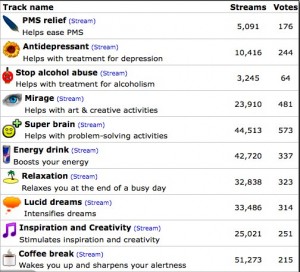 There have been many claims made about the effects of binaural beats from reducing anxiety to improving creativity and even producing drug-like feelings of happiness or euphoria. The hope that we can engineer a binaural beat experience, much like a drug, to create a specific brain boosting effect is very exciting. The idea of an audio or digital drug has caught on and there is even one company, i-Doser Labs, that markets binaural beats by the dose. You can try free doses HERE for improving energy, mental focus, lucid dreaming or even building a superbrain.
There have been many claims made about the effects of binaural beats from reducing anxiety to improving creativity and even producing drug-like feelings of happiness or euphoria. The hope that we can engineer a binaural beat experience, much like a drug, to create a specific brain boosting effect is very exciting. The idea of an audio or digital drug has caught on and there is even one company, i-Doser Labs, that markets binaural beats by the dose. You can try free doses HERE for improving energy, mental focus, lucid dreaming or even building a superbrain.
The question is, do binaural beat products really improve the performance of our minds and brains? Many people that use the products claim that they work. I have not been able to find many scientific or clinical studies on their effectiveness. We will continue to explore this issue on the Next Brain Blog.
If you have experience with binaural beat products or know of empirical studies on their effectiveness please leave a comment.
Source: Image of constructive interference pattern that creates binaural beat.
Combat soldiers, surgeons, ER professionals, Olympic athletes and others that face extreme-stress situations involving judgement must all develop high performance minds to be successful. Cognitive performance in extreme circumstances has been studied closely and training programs and techniques have been developed and tested. How to use these techniques to build a high performance mind will be a frequent topic on the Next Brain Blog.
 For example, The Mind Fitness Training Institute, is in the news for a program they have for training the minds of US combat soldiers. They just completed a pilot study that demonstrated how mindfulness training techniques can improve working memory and affective response (or emotional control).
For example, The Mind Fitness Training Institute, is in the news for a program they have for training the minds of US combat soldiers. They just completed a pilot study that demonstrated how mindfulness training techniques can improve working memory and affective response (or emotional control).
Soldiers in the program start by mastering attentional control and concentration using a mindfulness training technique. A briefing document explains:
“At first, exercises emphasize building concentration by focusing on one object of attention, such as the breath, contact between the body and the floor or chair, or sensations within specific body parts. This single focus of attention is maintained throughout a practice session; when attention wanders, it is returned to the object of attention. Later in the course, exercises require attending to body sensations during movement and “shuttling” the attention between inner sensations andouter experiences (i.e., sights or sounds).”
This technique is used in many other programs that promise to build a high performance mind. An important finding because it tells us:
The first step in developing a high performance mind is to practice attentional control and concentration using a very simple training technique.
And you don’t need to have an extreme-stress job or attend a special training program to get started. Here is what you do:
- Rest comfortably by laying down or sitting
- Close your eyes if you want to
- Focus on your stomach and feel your breathing
- Pay attention to all your bodily sensations in your belly as move through the complete breathing cycle of inhaling and exhaling
- If you mind wanders to another topic or sensation return your attention to your belly and the cycle of breath.
Your only task here is to bring your mind back to the sensation of breathing every time it wonders. Sounds simple but it takes practice. And what you are learning is invaluable – how to control your own mind!
15 minutes per day for a week should produce a noticeable result. At the very least you will have first hand experience in attempting to control you attention in a systematic way. If you try it and please share your experience by leaving a comment.
 I am often asked if there are specific vitamins that are proven to enhance brain and cognitive function. The answer is yes but the level of improvement is not always clear. Vitamins that are generally called out for their brain boosting effects include:
I am often asked if there are specific vitamins that are proven to enhance brain and cognitive function. The answer is yes but the level of improvement is not always clear. Vitamins that are generally called out for their brain boosting effects include:










